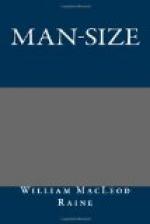Morse moved onto the ice and broke trail. The dogs followed in tandem—Cuffy, Koona, Bull, and Caesar. They traveled fast over the ice and reached the woods beyond. The timber was not thick. Beyond this was a second lake, a larger one. By the time they had crossed this, the sun was going down.
The men watched for a sheltered place to camp and as soon as they found one, they threw off the trail to the edge of the woods, drawing up the sledge back of them as a wind-break. They gathered pine for fuel and cut balsam boughs for beds. It had come on to snow, and they ate supper with their backs to the drive of the flakes, the hoods of their furs drawn over their heads.
The dogs sat round in a half-circle watching them and the frozen fish thawing before the fire. Their faces, tilted a little sideways, ears cocked and eyes bright, looked anxiously expectant. When the fish were half-thawed, Morse tossed them by turn to the waiting animals, who managed to get rid of their supper with a snap and a gulp. Afterward they burrowed down in the snow and fell asleep.
On the blazing logs Beresford had put two kettles filled with snow. These he refilled after the snow melted, until enough water was in them. Into one kettle he put a piece of fat caribou meat. The other was to make tea.
Using their snowshoes as shovels, they scraped a place clear and scattered balsam boughs on it. On this they spread an empty flour sack, cut open at the side. Tin plates and cups served as dish.
Their supper consisted of soggy bannocks, fat meat, and tea. While they ate, the snow continued to fall. It was not unwelcome, for so long as this lasted the cold could not be intolerable. Moreover, snow makes a good white blanket and protects against sudden drops in temperature.
They changed their moccasins and duffles and pulled on as night-wear long buffalo-skin boots, hood, mufflers, and fur mits. A heavy fur robe and a blanket were added. Into these last they snuggled down, wrapping themselves up so completely that a tenderfoot would have smothered for lack of air.
Before they retired, they could hear the ice on the lake cracking like distant thunder. The trees back of them occasionally snapped from the cold with reports that sounded like pistol shots.
In five minutes both men were asleep. They lay with their heads entirely covered, as the Indians did. Not once during the night did they stir. To disarrange their bedding and expose the nose or the hands to the air would be to risk being frozen.
Morse woke first. He soon had a roaring fire. Again there were two kettles on it, one for fat meat and the other for strong tea. No fish were thawing before the heat, for dogs are fed only once a day. Otherwise they get sleepy and sluggish, losing the edge of their keenness.
They were off to an early start. There was a cold head wind that was uncomfortable. For hours they held to the slow, swinging stride of the webs. Sometimes the trail was through the forest, sometimes in and out of brush and small timber. Twice during the day they crossed lakes and hit up a lively pace. Once they came to a muskeg, four miles across, and had to plough over the moss hags while brush tangled their feet and slapped their faces.




